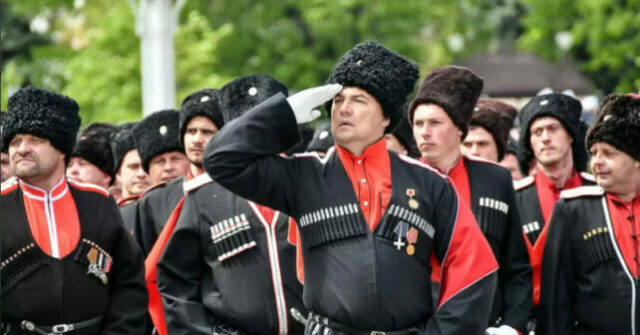
Russian Cossacks’ Integration With the State
Publication: Eurasia Daily Monitor Volume: 19 Issue: 132
By:

As Russia’s illegal re-invasion of Ukraine continues, a number of ramifications extend to the Russian domestic political scene with some, such as Yale University historian Timothy Snyder, positing on the incredible rise of the far right in Russia. Even so, the Cossacks appear to be one group that is improving its standing, being ever more tightly woven into Kremlin state structures.
Indeed, at a recent preparatory meeting of the All-Russian Cossack youth, the first deputy ataman of the All-Russian Cossack Society, Konstantin Perenizhko, said, “Today, the Russian Cossacks are involved in the implementation of the ‘special military operation’ for the denazification and denationalization of Ukraine, in the formation of a reserve mobilization. The ranks of the Immortal Cossack Regiment, unfortunately, were replenished with the names of graduates from Cossack Cadet Corps, young members of Cossack societies who died in Donbas. We mourn the loss of the youth leader of the Great All-Don Host, Georgii Sherstyukov … The time of the Cossacks as a social movement has passed. The Cossacks are becoming an integral part of the Russian state. The time has come when young Cossacks cannot stand aside—they must make adult decisions!” (Vsko.ru, August 8). The last line is a reference to an increased emphasis on encouraging young Cossacks to volunteer for the war in Ukraine. The same article goes on to acknowledge that 700 have already done so.
It is not clear what “young” means in this sense (whether legal minors or not), but it is likely that the Cossack volunteers are under 18 years old, considering the forum (See EDM, July 25). If so, this marks one of the first open admissions that minors are involved in conflict operations—an admission that underlines the manpower shortage Russia is facing and promises devastating long-term consequences for the country. The flower of European youth, including minors, was cut down in World War I, and some countries are still feeling the demographic consequences even today. For a Russian Federation already in a demographic tailspin, the effects will be even more severe (see EDM, June 30).
Other developments with the Cossacks also demonstrate the extent to which they are becoming further integrated with state structures. The All-Russian Cossack Society has, for instance, determined to create a “Northwestern Cossack Host” similar to the 12 that currently straddle Russia and illegally occupied Crimea. Leader of the organization, Nikolai Doluda, “discussed the prerequisites and conditions for the creation of a new Cossack host with the atamans of the Baltic divisions, the St. Petersburg Cossack circles, the Cossack division of the Republic of Karelia, the chief of staff of the ‘Central Cossack host’ and … the administration of Pskov Oblast.”
Aside from the territories already mentioned, the host would include the Vologda Cossacks and those from Leningrad Oblast. Although these regions lack Cossack roots, the descendants of Cossacks from the Don, Kuban, Siberia and Far East reside in these areas—with some having resettled in Kaliningrad. Indeed, Doluda suggested one use for the para-state formation when he said, “Today, [Baltic Cossacks] are boldly taking responsibility for solving state problems in the Kaliningrad region” (Vsko.ru, August 3). Whether “solving” these problems includes the use of violence is unclear, although problems have persisted due to Lithuania’s attempted blockade of the exclave (see EDM, August 2, June 21). Such an announcement could also conceivably presage an assault on the Baltic countries. In Luhansk, Donetsk and Crimea, Russia consolidated its hold on the regions via the formation of Cossack societies, and the ambiguous nature of Cossack identity—as an ethnic group or some other entity—could be manipulated into an excuse for war in the Baltics.
Regardless, the Russian Cossacks continue to play a role in historical re-enactments, projecting the myth of past national greatness into the future. Nowhere is this more apparent than in the celebrations of the festival of “the siege of Azov,” which takes place in the Rostov region. Although the event has been held since 2005 and is dedicated to the Turkish siege of the seat of the Cossacks, it took additional poignancy this year due to Russian President Vladimir Putin’s decree to celebrate the 350th anniversary of Peter the Great’s birth.
Moreover, “for Azov residents, the personality of Peter is of particular importance. Here, under the walls of the Ottoman fortress, at the end of the 17th century, the first military victory of the young king took place. Russian troops shed blood here … Don and Zaporozhe Cossacks” (Kazak-center.ru, August 7). The commemoration of an event when Russians and proto-Ukrainians fought together suggests one way in which Russia will try and reconcile with the Ukrainians once the war is over. Indeed, the Kuban Cossacks (descendants of Zaporozhe Cossacks) held a mounted commemoration of the 80th anniversary of the battle of Kuschevskaya village in 1942. During the battle, “the 17th Kuban Cossack Cavalry Corps gave a tough rebuff to the Nazis” and “about 4,000 people gathered at the memorial complex ‘Field of Cossack Glory’” (Vsko.ru, August 2).
Of course, every nation celebrates its military victories, but the near obsession with the past in Russia seems like another leaf from the far-right playbook. The Cossacks seem to be emerging as some kind of paramilitary force driven by historical memory with dangerous parallels to the Schutzstaffel (SS) of Nazi Germany.



